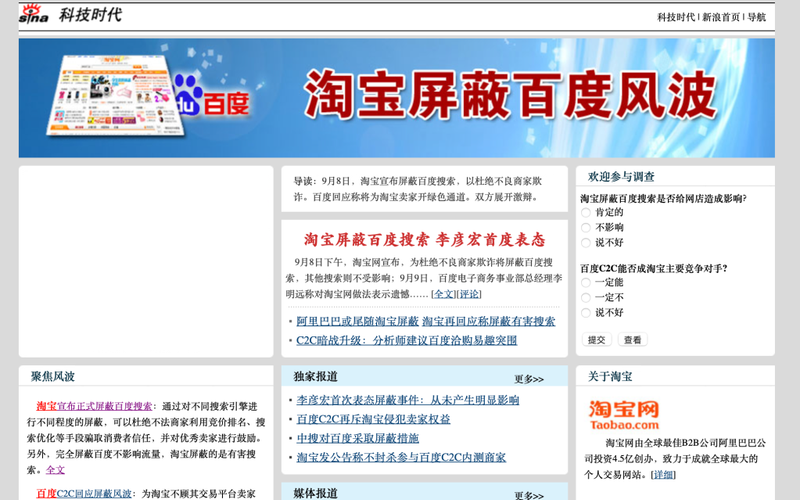icon
password
Multi-select
tags
ID
type
status
slug
summary
category
date
Author
URL
To put it simply: Baidu does not make its own Android, and China's Internet environment is not friendly to search engines as a business.
There is a term “BAT” on the Chinese Internet, which does not mean that flying mammal, but specifically refers to China’s once three biggest Internet corporations: Baidu,Alibaba,Tencent.
If you know a little bit about China’s Internet industry, you will know that these three companies are China’s Google, Amazon and Facebook.
This description was correct for a long time, until Baidu was no longer China’s Google, and gradually fell behind from the head of China’s Internet industry.
As a company, Baidu’s market capitalization has been surpassed by JD.com, Pinduoduo and Meituan in the past few years. Even unlisted Chinese companies, such as Bytedance and Kwai, have higher valuations than Baidu.
Your instinctive reaction may be that Baidu is undervalued, because if a company is really a Chinese version of Google, its share price can’t be so cheap. But in fact, Baidu is not undervalued, and its revenue is already significantly lower than those of new Internet companies.
How on earth did the Chinese version of Google fall behind? This seems to be a problem that needs to be explained.
Search Engine is no longer a good business in the era of mobile Internet
This may sound weird because Google is such a powerful company, yet it is true that search engines are no longer a good business on the mobile Internet.
In the early days, everything on the Internet was only stored in the form of a directory (such as Yahoo), and the search engine changed everything.
It enabled people to enter any keyword and actively get the information they wanted. The emergence of search engines at the beginning of this century not only made the Internet bid farewell to the simple imitation of physical libraries (archives), but also made it more convenient for more people with low digital literacy to use the Internet.
But compared with “Feed”, the search engine has been left behind. Although superior to directories, search engines are still not friendly enough to users, especially those who have been using the Internet since the birth of smart phones. Some of them don’t even type very well, and search engines have a high threshold for many users.
Today’s headline, a text news client driven by Bytedance’s recommendation algorithm, began harvesting market share in 2014, as we talked about in previous articles. Then the recommendation algorithm took over everything.
In the English-speaking world, it was not until the advent of TikTok that Feed driven by recommendation algorithms began to become the main way to organize Internet content. But in China, recommendation algorithms began to capture users through text content long before Douyin was born.
People no longer actively search for keywords, because for most people who are on the Internet, they don’t know what interesting content is on the Internet and what keywords should be searched. Recommendation algorithm-driven feed can solve this problem, so it conflicts with search engines to some extent.
You are reading Panda!Yoo
A blog about modern Chinese culture and consumption trends. If you are interested in Chinese food, drinks, games, movies, novels, dramas, please follow us.
Join 1,565 other subscribers
Google released Google Discover in 2017 and brought it to mobile in 2018, but in fact Chinese Internet companies crammed similar features into almost all App in 2015. When you open the browser, you will see a feed; When you open Wechat Moments, you will see a Feed; When you open Today’s headline, you will see a Feed.
Most people are so stuffed that they barely need to search anything anymore.
Baidu invested a lot of money in Feed in 2017, but by that time Today’s headline had almost monopolized the field. Therefore, this strategy has not played an obvious role.
In fact, the search engine is no longer the entrance for people to access the Internet, so the advertising value of Baidu has also become lower.
Private content pool
The value of search engines is to provide access to a huge pool of public content. But when all content libraries are private, independent search engines will no longer have value. China’s Internet industry has long been committed to building private content pools.
You may have heard that China has more than one social platform like the United States, and they have WeChat (like Facebook), Weibo (like Twitter), Today’s headline (like a combination of News Break and Medium), and so on.
But what you don’t know is that almost all of these platforms in China do not encourage publishers to use links to publish their own contents.
If you are an English writer, you may need to set up a WordPress Blog to write an article, and then post links to Facebook, Twitter, LinkedIn and Reddit.
But in China, if you are a writer, you need to copy and paste your text, retype and publish it on every platform such as WeChat, Weibo, Headline’s and so on.
All articles published on these platforms are not allowed to be searched by Baidu or any other third-party search engine.
In some applications, you can also post some external links, but these links will be downgraded in feed, and only a some group of readers can see it.

WeChat Public Account’s content hosting domain name blocks almost all search engines. The only external search engine that can search articles on WeChat is Sogou, because Tencent owned a large stake in Sogou a long time ago.
When WeChat became the main text content hosting platform in China, Baidu’s search function was almost hollowed out: you can’t find any content posted on WeChat on Baidu because Tencent blocks Baidu.
Baidu had to build its own content platform “Bai Jia Hao”, but the launch of “Bai Jia Hao” was 4 years later than that of WeChat Public Accounts – it was too late.
It is conceivable that a similar thing has happened in the field of short videos. You can’t find Douyin (TikTok) videos on Baidu. Therefore, Baidu has established its own short video products for this purpose – but too late, once bagain.
It’s like a map publisher, blocked by all the buildings in the city. It can only build a city on its own to make the map valuable again. It just doesn’t make sense.
The disappearance of advertisers
Baidu’s best-known cause of recession is a medical malpractice.
In April 2016, a young Chinese named Wei Zexi died due to a medical accident. But he died because he was led to a non-compliant private hospital by medical advertisements on Baidu, which defrauded him of his treatment fees and then gave him homeopathic therapy.
This not only wasted him money, but also made him lose the best time for treatment. This incident has caused a huge public opinion crisis in China, and Baidu was heavily criticized for it. Its core advertising business had also been questioned.
Due to the impact of the incident, Baidu has so far failed to repair its reputation in the Chinese market. In July 2019, three years after the incident ended, Baidu CEO Robin Li was attacked with mineral water at his company’s annual developer conference.
But in fact, there are still some deep-seated business reasons behind this. Baidu is not really indulging its irregular medical advertising business because of a loss of conscience, but because of the blocking of the Internet in China.
Just as Baidu is blocked by the main content pool on the Chinese Internet, the commodity pool and commercial service pool on the Chinese Internet has also early closed to search engines.

“Taobao blocking Baidu” is a big news on the Internet in China in 2008. via Sina
Taobao, China’s largest e-commerce site, shielded Baidu’s spiders in 2008. This means that users will no longer be able to find any products from Taobao on Baidu. Baidu launched Youa, its own e-commerce business that year, but was shut down in 2011 as the business reached an impasse.
The relationship between this and poor-quality medical advertising is as follows:
Search engine as a business model, its main revenue comes from advertising. Search engine companies slightly influence users’ decisions by inserting relevant ads before the first search result, while charging advertisers a fee.
Most of the people who put these advertisements are e-commerce operators. These e-commerce sellers attract users to buy their products by placing advertisements in search engines.
But when Taobao blocks Baidu, it means e-commerce sellers either quit Taobao or give up advertising on Baidu. Obviously, most people choose Taobao.
Similarly, this also happens in advertising alliances and application promotion.
For Google, a large portion of Google Ads’s revenue comes from independent websites and App developers embedding Google Ads SDK into their products. But in China, this is usually not allowed.
Due to the absence of Google, Chinese users usually download and install Android applications through the built-in App Store of various mobile phone manufacturers or directly in WeChat. These independent App Stores always carry out more rigorous review of the third-party SDK contained in the application.
This means that few independent developers use Baidu’s advertising platform to make money in their products, making it impossible for Baidu to take a cut.
In 2013, Baidu acquired a company called 91 Mobile, which then owned an iPhone jailbreak store for Chinese users and an Android App Store. But like Baidu’s efforts to build its own content pool, this also failed yet again.
[sociallocker id=”5614″]
All this makes Baidu’s advertising business lose many “normal and legitimate advertisers”. In order to supplement revenue, it has to relax its censorship standards for advertisers, which eventually leads to the tragedy of “Wei Zexi”.
Baidu failed to build a system similar to Android
To put it abstractly, all the problems faced by Baidu have also been encountered by Google.
Google has also competed with private content pools in the mobile Internet era and clashed with e-commerce sites. But the reason why Google can overcome all the difficulties is that it created Android.
Before the birth of the mobile Internet and recommendation algorithms, it was almost impossible for people to bypass search engines to use the Internet.
Because although URL exists, it is difficult for most users to remember those URL. People habitually open Google, to search for what they want, and then start reading destination websites or web pages. Therefore, the search engine was the gate to the Internet at that time.
But as mentioned earlier, the gate can now be bypassed. The Internet has now changed from a whole amusement park with one gate to several theme parks with multiple ticket windows. Instead of entering the Internet through the “gate” of search engines, users go straight to an App, and see what interesting information it sends to them.
Google seems to have realized this a long time ago, and it has built a new gate: Android.
By 2020, users around the world almost only use iOS and Android to access the mobile Internet. This means that, to some extent, Google still controls half the door to the Internet portal, where it has the right to collect tolls or add ads.
But Baidu’s attempt, like other Chinese internet companies, has failed.
Baidu’s own operating system was originally designed for smartphones. But with Android and iOS becoming monopolies in China, Baidu’s operating system has become its own operating system for Internet of things devices, appearing only in devices such as smart speakers, smart washing machines and projectors.

Although many Internet companies in China have launched smart speakers, Baidu has achieved success in this area through low prices and special optimization for older users.
Baidu’s smart speaker has done so well in the Chinese market that it can almost be called the Chinese version of Amazon Echo. But we all know that smart speakers are not a particularly profitable business. At least it doesn’t make as much money as search engines and mobile operating systems.
None of Baidu’s products have successfully become the ticket gate of the new theme park-the mobile Internet, which is the reason why it has gradually failed to become “the Chinese version of Google”.
Objectively speaking, apart from the tragedies it has indirectly caused in medical advertising, Baidu is not a bad company.
As an Internet company, it is a leader in many aspects of artificial intelligence. But this technological lead is not enough to make up for its revenue after the decline of search engines. This makes the gap between it and its former competitors, Alibaba and Tencent, too wide to bridge.
Baidu’s full-year revenue in 2019 is still as high as 107.4 billion yuan (about $16.164 billion), which means it still has enough cash to support a large-scale transformation and corporate reform. Maybe one day, Baidu will return to the poker table. This may be due to the success of a brand new business, or because China’s antitrust censorship has effectively hit Baidu’s competitors.
But there is another possibility that it has never been able to find a business to replace search engines and gradually disappear into mainstream companies, like Yahoo.
[/sociallocker]
- Author:NotionNext
- URL:https://pandayoo.com/2020/11/09/how-baidu-lags-behind-in-the-competition-of-chinese-internet-companies
- Copyright:All articles in this blog, except for special statements, adopt BY-NC-SA agreement. Please indicate the source!